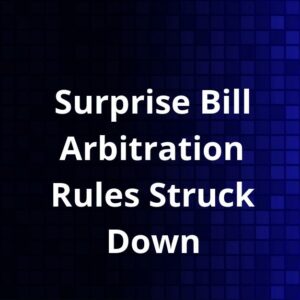**Federal Judge Again Strikes Down Key Provision of "No Surprises Act" Arbitration Rule, Causing Uncertainty**
A federal judge in Texas has for the second time struck down critical elements of the Biden administration's rules for resolving disputes under the "No Surprises Act," casting fresh doubt on the process designed to protect patients from unexpected medical bills. The decision, handed down in February 2023 by U.S. District Judge Jeremy Kernodle in Texas, has left the future of payment dispute arbitration "up in the air."
The "No Surprises Act," which took effect on January 1, 2022, aimed to shield patients from exorbitant "surprise medical bills" when they unknowingly receive care from out-of-network providers, particularly in emergency situations. The law shifted the responsibility for payment disputes between insurers and providers, removing the patient from the middle.
Central to the act's implementation was the establishment of an independent arbitration process to determine payment when insurers and providers could not agree. The Biden administration's initial rule, issued early in the act's rollout, directed arbiters to primarily focus on the "qualifying payment amount" (QPA). The QPA represents the median in-network rate for a service in a specific geographic area, a metric that providers argued disproportionately favored insurance companies during negotiations.
Hospitals, doctors, and air ambulance companies quickly challenged this "QPA-first" approach, contending it would hinder their ability to negotiate fair prices and potentially compromise access to care. In February 2022, Judge Kernodle sided with the providers, striking down this part of the administration's rule.
Following that initial setback, the administration issued an updated rule in August 2022. While this revised guidance allowed arbiters to consider all relevant information, it was still perceived by providers as heavily emphasizing the QPA. This perceived bias led to further legal action.
In February 2023, Judge Kernodle once again ruled in favor of the providers. He determined that even the updated rule continued to place undue weight on the QPA, failing to align with Congress's original intent for a balanced arbitration process. His latest decision struck down additional parts of the arbitration process, exacerbating the uncertainty surrounding how these disputes will be resolved.
The Biden administration stated it is "reviewing the court’s decision and evaluating next steps." Officials expressed concerns that the ruling could "create confusion and delays" for patients who rely on the "No Surprises Act" for protection against unexpected medical costs. The ongoing legal challenges, all originating in Texas, continue to impact the nationwide implementation of this significant patient protection law.

